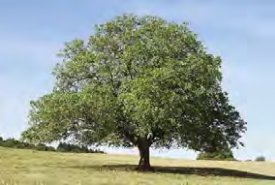AgEBB-MU CAFNR Extension
Green Horizons
Volume 24, Number 3
Fall 2020
Remembering Scott Brundage
"A champion of managed forests"
Dusty Walter, CAFNR AES, Natural Resource Management
On August 8, 2020, Mr. R. Scott Brundage passed away at the age of 84. With Scott's passing, forestry has lost a strong champion. His voice will be missed, but his legacy will continue wherever and whenever forestry is practiced.
In the mid 1990s, like many other past forestry students attending the University of Missouri, I found myself taken under the wing of Scott Brundage. At the time, I had no idea how long our friendship would continue, how many laughs we'd share, or the direction and paths that he would enable me to travel.
Scott believed that forests could make money. When I met him, he was president of the Missouri Consulting Foresters Association and had a Christmas Tree Farm. Initially, that was all I knew of the man. However, he had a strong work ethic and a desire to mentor others. He soon invited me to work for him, both on consulting jobs and shearing Christmas trees. In Scott, I found a teacher outside the classroom - one who put into practice what I was being taught and did so in a way that, yes, was ecologically sound, was good for forest health, enhanced the land for wildlife, and always applied to make economic sense! From planting thousands of trees, to management across thousands of acres, and overseeing the final harvest, Scott had done it all - forestry was in his blood!
 |
Scott was a founding member of the Missouri Consulting Foresters Association. He also served as president for many years. He always supported managed forests, and management by a professional. He believed that every forest acre should have a plan! And, that if it costs money, it should make you money! Recently I shared some memories of Scott with Mr. Fred Crouse, and he summed up one of Scott's philosophies in this way: "The way a forest was managed should make you a dollar, and allow you to keep as much of that dollar as possible." To that end, Scott wrote many articles - for the Walnut Council and handouts for landowners. A few of those titles include: Evaluating White Oak Logs; Selling Timber on the Shares: a good or Bad Deal, and for Whom?; When to Prune Black Walnut Trees; Grapevines - Another Reason to Hate Them. And, he wrote one titled The Dirty Dozen, which I feel captured much of his management philosophy. Here's the opening paragraph by Scott: "On our Tree Farms, which we intensively manage for forest products including high quality timber (i.e., prime sawlogs and veneer) and wildlife (e.g., deer and turkey), we try to kill twelve species of trees, shrubs, and other pants which have little or no future forest products value. These dozen plants will ruin the future of our Tree Farms both for timber and wildlife production. The twelve species are called "weed species." We weed our gardens and flower beds, and we weed our crop fields, and we should weed our woods to make them more productive for both wood and wildlife."
Scott was a forester, an avid hunter, and an educator. He grew up in Indiana and received a Master of Science Forestry Degree from Purdue University. But his home with wife Ginny and sons Robert and Thomas was in Missouri. He was the founding father and past president of Missouri Big Bucks Club. He joined the Walnut Council in 1994, and by 2000 he had encouraged me to join as well. With Scott as chapter president, I served as secretary of the Missouri Chapter of the Walnut Council for many fun years. Scott went on to be president of the National Walnut Council and served on the board, as well as the Walnut Council Foundation Board of Directors. He served on the MU School of Natural Resources Advisory Board. He was a member of Missouri Farm Bureau and served on their Forestry Committee. He was also instrumental in starting the Missouri Forest Resources Advisory Council (MoFRAC). Serving on all these boards and committees was not just a title or resume builder to Scott. In so many ways, he held the forestry profession and others feet-tothe-fire.
When Fred Crouse and I met to share a toast to Scott and our memories of him, Scott's strong voice resonated, "Let me get this straight," and "I don't have a question, but I do have a comment." If you were presiding over a meeting and Mr. Brundage had something to say, you'd do well to pay attention. You might not always agree with every comment or question Scott had, but his combination of knowledge and experience were second to none. Scott talked-the-talk and walked-the-walk and held us all to a high standard.
Personally, I will miss Scott Brundage. He was a dear friend and mentor to me. His legacy and advocacy for managed forests will continue. Whether through diverse groups and boards on which Scott served, or in the experience and knowledge he passed on to so many of us as young foresters, Mr. Scott Brundage will continue to improve the woods and forests he loved.
Scott, I hope you are in a place with only veneer walnut trees and stave-quality white oak, and with monster bucks dancing through the woods. Peace to you, my friend.
If you'd like to honor Scott by contributing to his lifelong passion, contributions can be made to the following:
 |
